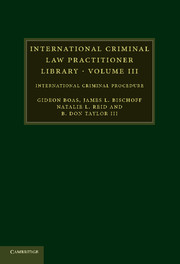Book contents
- Frontmatter
- Contents
- Foreword
- Table of authorities
- Table of short forms
- 1 The nature of international criminal procedure
- 2 Creation and amendment of rules of international criminal procedure
- 3 Procedures related to primacy and complementarity
- 4 Investigations, rights of suspects, and detention
- 5 Defence counsel, amici curiae, and the different forms of representation of accused
- 6 Pre-trial proceedings
- 7 Trial proceedings
- 8 The role and status of victims in international criminal procedure
- 9 Evidence
- 10 Judgement and sentencing
- 11 Appeal and revision
- 12 Conclusion
- Index
- References
8 - The role and status of victims in international criminal procedure
Published online by Cambridge University Press: 05 August 2011
- Frontmatter
- Contents
- Foreword
- Table of authorities
- Table of short forms
- 1 The nature of international criminal procedure
- 2 Creation and amendment of rules of international criminal procedure
- 3 Procedures related to primacy and complementarity
- 4 Investigations, rights of suspects, and detention
- 5 Defence counsel, amici curiae, and the different forms of representation of accused
- 6 Pre-trial proceedings
- 7 Trial proceedings
- 8 The role and status of victims in international criminal procedure
- 9 Evidence
- 10 Judgement and sentencing
- 11 Appeal and revision
- 12 Conclusion
- Index
- References
Summary
Although justice for the victims of mass atrocity – generally cast as retribution for the offender – has long been one of the central themes justifying international criminal trials, victims have not, until relatively recently, played a central role. Often characterised as a direct result of the domination of the adversarial approach at the ICTY, ICTR, and SCSL, victims before those courts are essentially treated as witnesses. Their direct participation in the proceedings is strictly limited to giving evidence. Their input at other stages of the process is formally non-existent, their right to reparations is limited, and their practical influence negligible.
The Rome Statute transformed the role and status of victims in international criminal procedure. As a result, victims in proceedings before the ICC enjoy a panoply of participatory rights. Although their status at various stages of the proceedings falls just short of that of the parties, their direct participation is guaranteed. Their rights to orders for reparation are greatly expanded, as is at least the possibility of collecting such reparations. Their influence on the Court's first cases has already been important, and their role in the work of the ICC promises to be considerable.
While this seminal development in international criminal procedure has been lauded by many, several constituencies remain suspicious or conflicted. The Prosecutors are understandably wary of any perceived encroachment on their independence in deciding what cases to charge, or interference with their control of the case at trial.
- Type
- Chapter
- Information
- International Criminal Law Practitioner LibraryInternational Criminal Procedure, pp. 303 - 334Publisher: Cambridge University PressPrint publication year: 2011



